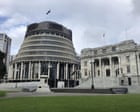
The interplay between politics, human rights, and public demonstrations continues to capture global attention, as evident in recent events from different parts of the world. These stories, though diverse in nature, are united by their focus on governance, civil rights, and community expressions. This article brings together these narratives, offering a calm exploration of their significance.
In New Zealand, a discourse around electoral reform is unfolding, initiated by Prime Minister Christopher Luxon’s government. The proposed changes aim to address what are described as “outdated and unsustainable” practices in the electoral system. Among the notable suggested reforms are the cessation of voter enrolment 13 days before the election, a total ban on prisoner voting, and restrictions on providing free food, drink, or entertainment near voting stations. Despite the reforms’ intent to modernize the electoral framework, they have been met with concerns. Notably, the Attorney General Judith Collins has warned that these changes could potentially breach human rights laws, potentially disenfranchising over 100,000 voters, including a significant Māori population. The conversation continues as stakeholders evaluate the impact of these proposals on New Zealand’s democratic processes.
Across the Tasman Sea in Australia, Sydney’s political landscape also features a notable development. Clover Moore, the Lord Mayor of Sydney, has voiced support for a potential pro-Palestine march across the iconic Sydney Harbour Bridge. This proposed demonstration aims to be a powerful symbol of solidarity, pending the determination of sufficient community sentiment. While the New South Wales Premier has expressed concerns about potential chaos, some political figures, including a New South Wales Labor MP, advocate for the facilitation of the march, suggesting it could be organized within a few weeks with appropriate planning. The differing perspectives highlight an ongoing dialogue about the balance between expression and public order.
In the United States, the judicial system has recently addressed a significant issue concerning reproductive health services. A federal judge has mandated the continuation of Medicaid reimbursements to Planned Parenthood clinics. This decision comes amidst efforts by the Trump administration to “defund” the organization through legislative measures. The recent ruling expands upon an earlier injunction, ensuring that Planned Parenthood affiliates are not deprived of Medicaid funding. As the organization navigates political challenges, this development underscores the complexities of healthcare funding and reproductive rights in the nation.
These stories, emanating from distinct corners of the world, underscore the intricate relationship between government initiatives, legal interpretations, and public sentiment. They reflect an ongoing pursuit of balance—whether in crafting inclusive voting laws, enabling public demonstrations, or ensuring access to health services. As each situation unfolds, it serves as a reminder of the importance of dialogue, consideration, and the protection of rights in shaping harmonious societies.
Source: {link}
